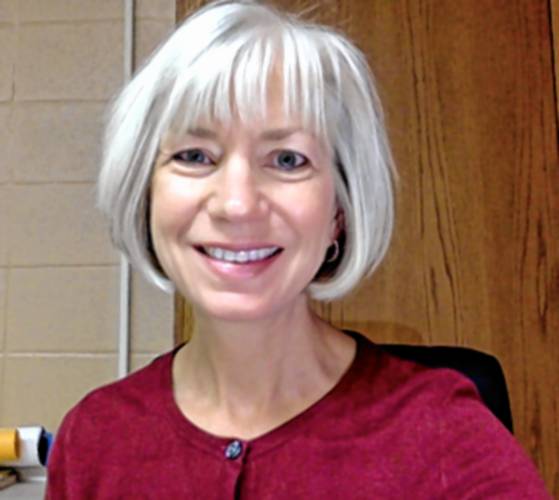Chalk Talk: Fighting for our libraries: Why schools need strong library programs and librarians

Leslie Skantz-Hodgson is the librarian at Smith Vocational and Agricultural High School in Northampton and a teacher-consultant with the Western Massachusetts Writing Project. CONTRIBUTED
| Published: 10-19-2023 3:28 PM |
My school’s library isn’t just a place to check out books, do research or attend my classes. It’s where students can eat breakfast and lunch if the cafeteria feels too overwhelming. It’s a space where an anxious student can come to relax. It’s where students can collaborate on group work; to get help on schoolwork; to ask questions.
The library at my school is not unique — any school librarian will tell you their library addresses the needs of diverse students. Above all, school librarians will say, it’s a place where young people of all identities can feel free to be themselves.
That’s why I was horrified to learn over the summer that in Houston, Texas, dozens of school librarians lost their jobs, and in many cases, the libraries that once offered a sense of freedom now house internal school suspension. The former libraries are places where punishment — instead of the rewards of exploration and learning — is experienced.
When I was an English teacher, a math teacher I worked with used to punish misbehaving students by having them write the same sentence over and over. I finally asked him not to do that; it would turn students off of writing. I have a similar reaction now; students going to a library for punishment may develop a negative association with libraries. But it goes way beyond that. In eliminating libraries and librarians, incredibly valuable resources have been thrown away, and that’s what is really heartbreaking.
Depending on their setting, school librarians do a wide range of teaching and other work. In my role, I teach all ninth graders how to use the library and its resources, how to be safe online, how to evaluate news and media, and basic research skills. With the older grades, I teach more involved research skills, along with resume and letter writing. Each day calls for different demands on my time and skills. I’ve been asked by colleagues and students to help write a grant, college or scholarship application. I’ve fielded requests to check for plagiarism and uses, misuses and abuses of artificial intelligence. I tutor students, read to them, and help with technology issues. I find books in accessible formats, articles in other languages or reading levels, and supplemental texts to support curriculums. I’ve taught students how to write children’s books and take good notes.
School librarians need to be familiar with the standards of the subjects taught in their schools. At a career technical school like mine, that means I need some knowledge of not only the academic content standards, but the standards for our 15 technical programs as well. I need to know what good lesson planning and pedagogy requires. I need to know what students are interested in reading. I do frequent marketing of our resources and advocacy work. The list goes on, and I welcome the challenges and opportunities.
I also feel lucky to teach where I do; some school librarians aren’t just undervalued, like the ones in Houston, they are downright slandered.
Amanda Jones is one example. Jones has received several national honors, including School Library Journal’s 2021 School Librarian of the Year for her work at Live Oak Middle School in Louisiana. After Jones spoke against book bans in general terms at a meeting of the Livingston Parish Library Board, two local men reported online that she promoted “pornography and erotica” to kids, and made other outrageous and ugly claims that were demonstrably false. She’s received hate messages and threats to her and her family’s safety. Jones is suing for defamation, asking for $1 in damages and a public apology. I haven’t been subjected to that kind of awful treatment, but Jones’s case isn’t an isolated one. A survey by School Library Journal found that about a quarter of school librarians experienced harassment in the last year.
Article continues after...
Yesterday's Most Read Articles
There’s hope, however. In stark contrast to Houston, the Boston Public School system understands the value of school libraries and librarians. They’ve pledged that every public school in the city will have access to a school library program and librarian by 2026. Already, Boston has hired dozens of school librarians to meet that goal.
It’s a smart move; studies show that strong school library programs contribute to student success. Not just just in test scores, but in graduation rates and other indicators of achievement. And that success is not just in wealthy communities, but across the income spectrum.
When you also consider the harder-to-quantify benefits, like the feelings of safety and support students experience in a school library, then the assertion Albert Einstein once made makes perfect sense: “The only thing you absolutely have to know is the location of the library.”
Leslie Skantz-Hodgson is the librarian at Smith Vocational and Agricultural High School in Northampton and a teacher-consultant with the Western Massachusetts Writing Project.

 Valley Bounty: Grass-fed animals that feed the grass: Gwydyr Farm in Southampton focuses on ‘restoring the connection between land, food and people’
Valley Bounty: Grass-fed animals that feed the grass: Gwydyr Farm in Southampton focuses on ‘restoring the connection between land, food and people’ Weekly Food Photo Contest: This week’s winner: Mary Chicoine of Easthampton
Weekly Food Photo Contest: This week’s winner: Mary Chicoine of Easthampton  Speaking of Nature: A romantic evening for two birders — To hear the wonderful sounds of the Saw-whet Owl one must go outside at night
Speaking of Nature: A romantic evening for two birders — To hear the wonderful sounds of the Saw-whet Owl one must go outside at night Speaking of Nature: Where have all the birds gone?: They’re there, and here’s a handy tool to keep track of their appearances
Speaking of Nature: Where have all the birds gone?: They’re there, and here’s a handy tool to keep track of their appearances
